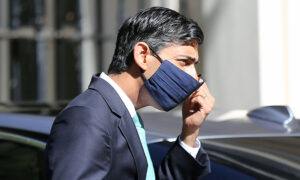More than a third of companies believe that the chancellor should increase taxes to tackle greenhouse gases as part of “a carrot and stick” approach to driving the transition to net zero.
A survey of more than 1,000 businesses by EY released days before Rishi Sunak delivers his third budget found that 39 per cent of respondents thought taxes should go up to raise the cost of emissions.
Last week the government set out its blueprint for reaching net zero carbon emissions by 2050. Analysis released by the Treasury showed that Britain faces a £37 billion-a-year black hole as revenues from fuel duty disappear.
Chris Sanger, head of tax policy at EY, said that companies recognised “there’s a role to play for both the carrot and the stick” in the push for net zero. “The stick is a greater burden on the use of carbon-intensive energy, with the carrot being tax relief for investment into greener sources of power,” he said.
The budget on Wednesday comes just before the Cop26 climate conference in Glasgow, which starts on Sunday. British businesses are bracing for a tough winter, with surging energy prices, labour shortages and widespread supply chain disruption pushing up inflation. Companies also are worried about the forthcoming rise in national insurance contributions that will take effect in April, as well as the recent resurgence of coronavirus cases.
It emerged over the weekend that the budget will include a £1.4 billion investment fund that will provide grants to encourage overseas companies to invest in British industries such as life sciences and electric cars.
The EY survey found that attracting investment to Britain was the main concern for companies, with almost two thirds of respondents saying that this should be a priority for Sunak.
The Federation of Small Businesses urged the government to relieve pressure on its members. Its latest quarterly survey found that worries about taxes were at a two-year high. It called for the employment allowance to be lifted to £5,000 from £4,000 and for lower VAT on utility bills for the smallest firms.
More than 200 hospitality bosses have signed a letter to the chancellor calling for VAT on the industry to be kept permanently at 12.5 per cent. It was lowered from 20 per cent to help pubs and restaurants during the pandemic.
Yorkshire Building Society called on Sunak to scrap the lowest stamp duty band to help the housing market.
Read more:
UK businesses tell Chancellor to raise taxes to help push for net zero
















